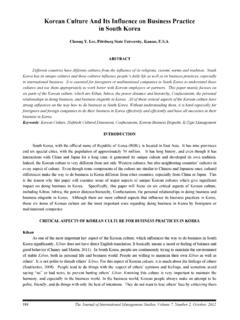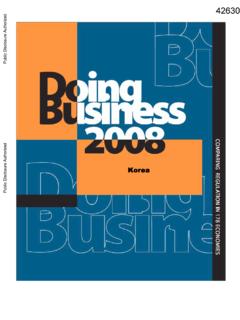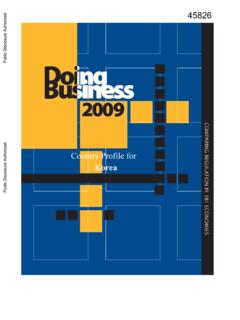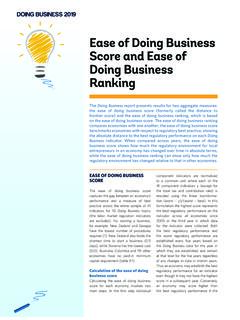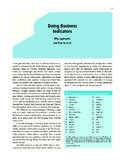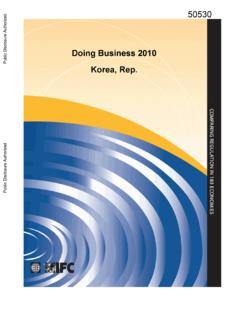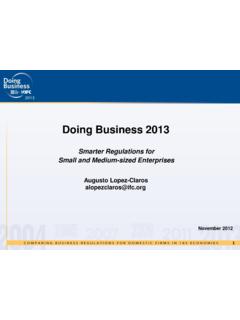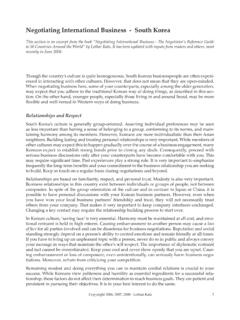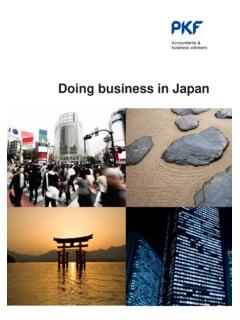Transcription of DOING BUSINESS IN - storage.googleapis.com
1 DOING BUSINESS INSOUTH KOREADOING BUSINESS IN SOUTH KOREAD ocumentation issued in July 2016 by Induk Accounting Corporation, an independent member of PrimeGlobal. The information provided is general information. Your company should check with a professional accountant to ensure that your issue is in line with the general information FORMATION IN SOUTH KOREAMAIN FORMS OF COMPANY/ BUSINESS IN SOUTH KOREAT here are three ways by which foreigners (foreign corporations) can enter korea for BUSINESS purposes: establishing a local corporation, a local branch, or a liaison Corporation The establishment of a local corporation in korea by a foreigner (individual or corporation) is regulated by the Foreign Investment Promotion Act and the Commercial Act. For a local corporation to be recognized as a foreign-invested company under the Foreign Investment Promotion Act, a foreigner must invest not less than 100 million won in the local corporation and acquire not less than 10 percent of the company s stocks with voting corporation established by a foreigner with an investment of not less than 100 million won is also recognized as a foreign investment under the Foreign Investment Promotion and Liaison Company A domestic branch of a foreign company can be classified into a branch and a liaison office depending on whether the entity engages in sales activities.
2 A branch that operates a BUSINESS that generates profit in korea is not considered foreign direct investment because it is a branch of a foreign company, not a domestic liaison office does not carry out businesses that generate profit in korea , but instead undertakes non-sales functions such as market research and R&D. Unlike a branch, a liaison office does not need to undergo registration, and is granted an identification number equivalent to the BUSINESS registration number at a jurisdictional tax office in TAX CONCERNS RELATED TO ESTABLISHING A COMPANYC orporate Tax Domestic businesses are obligated to pay corporate tax for all income generated domestically and in foreign countries, while foreign businesses are obligated to pay corporate tax for income from domestic sources. Corporate tax for income from the BUSINESS year is levied for the income of businesses in each BUSINESS year.
3 In the event that land, buildings, housings or adjoining land in specific areas are transferred or land for non- BUSINESS purposes is transferred, corporate tax for land and other transfer income is additionally levied. Where a domestic BUSINESS is dissolved, corporate tax on liquidated income is Tax Rate on Corporate IncomeTax BaseTax Rate200 million won or less10%More than 200 million won but not exceeding 20 billion won20 million won + amount in excess of 200 million won x 20%Exceeding 20 billion won3,980 million won + amount in excess of 20 billion won x 22%*Corporate local income tax equivalent to approximately 10 percent of the corporate tax is imposedDOING BUSINESS IN SOUTH KOREAD ocumentation issued in July 2016 by Induk Accounting Corporation, an independent member of PrimeGlobal. The information provided is general information. Your company should check with a professional accountant to ensure that your issue is in line with the general information Added TaxValue added tax (VAT) is a tax levied on added value (profit) acquired in the process of the transaction of products (goods) or the provision of services.
4 korea imposes VAT on value generated at each step of a transaction, and applies a VAT rate of 10 percent. The VAT imposed on businesses is calculated by subtracting the purchase tax from the sales Tax (Payroll) When wage (including bonus) is paid every month, tax is withheld based on the table for simplified tax amounts. In February of the following year, employees submit documentary evidence for income deduction for year-end tax settlement. LEGAL ISSUES RELATED TO ESTABLISHING A COMPANYOut of a total of 1,145 categories of BUSINESS listed under the Korean Standard Industrial Classification (KSIC), foreign investment is not permitted in 60 categories including public administration, diplomacy, and national defense (unpermitted categories of BUSINESS ), while foreign investment is permitted in 29 categories (restricted categories of BUSINESS ) by Foreign Investment Promotion investment is also prohibited in restricted categories of BUSINESS in principle.
5 However, when there are standards for permission, foreign investment is partially BUSINESS IN SOUTH KOREAD ocumentation issued in July 2016 by Induk Accounting Corporation, an independent member of PrimeGlobal. The information provided is general information. Your company should check with a professional accountant to ensure that your issue is in line with the general information ESTABLISHMENT IN SOUTH korea :BRANCH OR SUBSIDIARY?DEFINITION OF A PERMANENT ESTABLISHMENTThe conditions for Korean permanent establishments (PEs) include: An ordinary PE exists when a foreign corporation has a fixed place through which it conducts all or part of its domestic BUSINESS . A deemed PE exists when a foreign corporation without any fixed place through which it conducts domestic BUSINESS operates its BUSINESS in korea through a person authorized to repeatedly enter into contracts on behalf of the foreign corporation or a similar AND MAIN DIFFERENCES BETWEEN A BRANCH AND A SUBSIDIARYE stablished as a local company by foreigners (foreign corporations), a subsidiary company has a closer relationship with the local BUSINESS community and the opportunity for incentives depending on the type of BUSINESS based on the Special Tax Treatment branch office is treated as a separate taxable entity and able to operate as a revenue generating entity.
6 Sales and manufacturing activities are allowed. There is no minimum capital requirement at establishment. Tax incentives are not available to branch AND ACCOUNTING OBLIGATIONSA branch is obligated to pay corporate tax for income from domestic sources subsidiary company is generally required to lodge externally audited financial statements and the statutory accounts should be reported to the Korean tax authority annually together with the corporate income tax stock company with total assets equal to or greater than KRW 12 billion as of the end of the preceding fiscal year is required to have externally audited financial branch office is not required to lodge externally audited financial statements, but they have to submit the financial annually together with the corporate income tax FORMALITIESThe procedure for establishment of a local corporation can be classified into five steps:1.
7 Foreign Investment Notification Persons required filing the notification at designated head offices or branches of domestic banks (foreign exchange bank) and domestic branches of foreign BUSINESS IN SOUTH KOREAD ocumentation issued in July 2016 by Induk Accounting Corporation, an independent member of PrimeGlobal. The information provided is general information. Your company should check with a professional accountant to ensure that your issue is in line with the general information Investment Capital Remittance Investment capital may be remitted to domestic banks from overseas, at this time, domestic capital doesn t Incorporation/ BUSINESS Registration Place for registration A competent court and jurisdictional tax Transfer of Paid-In Capital to Corporate Account Upon completion of the incorporation registration and BUSINESS registration, companies are incorporated and the paid-in capital deposited in a temporary account can be transferred to a corporate Foreign Investment Company RegistrationSTANDARD LEGAL OBLIGATIONS AND FORMALITIES FOR A BRANCH1.
8 Notification of Branch Establishment In principal, a foreign company should report the establishment of a domestic branch to the head of a designated foreign exchange Registration of Branch Establishment Under the Commercial Act, branched are collectively referred to as BUSINESS office . The Act stipulates that a BUSINESS office should be registered where a foreign company carries out sales activities in BUSINESS IN SOUTH KOREAD ocumentation issued in July 2016 by Induk Accounting Corporation, an independent member of PrimeGlobal. The information provided is general information. Your company should check with a professional accountant to ensure that your issue is in line with the general information TO HIRE MY FIRST EMPLOYEE IN SOUTH KOREAMAIN LEGAL STEPS TO FOLLOW TO HIRE A FIRST EMPLOYEEWhen employing workers in korea , the laws regarding recruitment, salary, and dismissal should be observed.
9 korea s labor laws are largely divided into four categories: individual employment-related laws, collective labor relations laws, cooperative labor relations laws and employment-related laws. Labor laws set the standards for labor contracts and labor relations, enable the voluntary resolution of disputes between labor and management by guaranteeing workers right to organize a union, and ensure mutual benefits to labor and management by promoting the participation and cooperation of employers and Wages refer to money or other valuables paid to employees in exchange for their services, regardless of how they are called (wage, salary, bonus, etc.). Wages shall be paid at or above the minimum wage set by the Minister of Employment and Labor every year. The minimum wage for 2016 is set at 6,030 won per hour, and 48,240 won per day (8 hour workday).The Labor Standards Act classifies wages into ordinary wage and average wage, and retirement payment and other allowances set by law are to be calculated based on one of these two wage categories.
10 Average wage refers to the total amount of wages paid to a worker during the three months prior to the event ( retirement) necessitating the calculation of the average wage, divided by the total number of days during the same period. Average wage is used to calculate retirement payments, BUSINESS suspension allowances, and industrial accident compensation. Ordinary wage refers to wages by hour, day, week, or as otherwise outlined in an employment contract for certain work performed, or for the total number of working hours. Allowances for extended work, nighttime work, holiday work, annual paid leave, and advance notice of dismissal all fall into this Hours The standard working hours set by the Labor Standards Act are eight hours per day and 40 hours per week. The working hours prescribed by the Act should not be exceeded. If carried out by the order of the employer, work preparation hours, waiting hours, training hours and organizing hours outside the standard working hours shall all be counted as working beyond the standard working hours should be agreed upon by the employer and employee.










